- Home
- William Kennedy
The Ink Truck Page 15
The Ink Truck Read online
Page 15
“To where be you bound?” the masked horseman asked, coming close with muffled hoofbeats and reining his horse in front of Bailey.
“Why should I answer a man with a mask?”
“You do be answering, or go back from whence you came. And from where do you be coming?”
“From the library.”
“An arrogant liar. Where did you get that uniform? To which army do you belong?”
“To none. I’m a civilian, going to the city.”
“On what business?”
“None in particular. I’m a sightseer, I suppose.”
“Twice a liar. The people are leaving the city in great numbers, and you come to see the sights? You will be watched. Take note of that.”
As with the passing stream of faces, Bailey recognized something in the rider: voice, perhaps, or manner, or possibly the eyes. But he could connect the familiarity with no name.
“Get to the quarantine shelter,” the rider told him. “The doctor will say whether you’ll enter the city or not.” The rider indicated a slanted-roof building ringed by a post-and-rail fence; then he turned his horse and rode back where he came. Bailey headed for the quarantine shelter, where a woman and a boy together, and one man alone, sat on wooden benches along the wall of an almost empty room. Bailey stood watching. A man wearing a mask like the rider raised his head above a wooden partition and told Bailey to sit down, then ducked back behind the partition. The woman and the boy looked at Bailey. The man alone kept his eyes on the ground.
“How long have you been here?” Bailey asked the woman.
“Three days.”
“When will you leave?”
“When they let me. Some stay as much as a week. But they feed you all right, which is more’n you might get in the city, prices bein’ what they are and the farmers scared to come in t’ sell anything. Potatoes a dollar a bushel. Mind that, would you, when they used to sell for twenty-five cents.”
“Why do they keep you here?”
“They want to see if you’re sick with the cholera. They can usually tell in a few days.”
“If you haven’t got it, you’ll surely get it here.”
“You’ll get it sure anywhere, is how I look at it,” the woman said. “One of three that gets it dies. Sometimes more.”
A man in a red hood and wearing gloves, boots and sweat-stained shirt and trousers approached Bailey and studied his eyes. He took off a glove and felt Bailey’s forehead and wrists. He gave Bailey a drink of water and ordered him to drink it all, then sat and waited for Bailey to vomit. When Bailey did not, when he also replied negatively to inquiries about diarrhea and collapse and dryness of his body, the hooded man went once more behind the partition.
“All of us gets that,” the woman said. “And some says he’s not very particular where he checks the ladies for fever, though he was a gentleman with me.”
The man alone stood and screamed: “I must get to the city!” He pounded the partition. “I must get to my family.” He got no response.
“Poor man,” the woman whispered to Bailey. “He doesn’t know his family’s dead. The ones here think he’s coming down with it too. It’s his second day here.”
“Then why do they leave him with other people? Why not put him with the ones who have it, instead of letting him contaminate others?”
“I do believe they have,” the woman said.
Bailey stared at her. “You have it?”
“I do believe,” she said.
“And the boy?”
“I do believe.”
“Why didn’t you go someplace else? Anyplace else?”
“I have no place to go. We left the city to go to my sister’s funeral. I only live a little ways inside the gate, just me and the boy. But now I don’t know as we’ll get there.”
She nodded her head, satisfied with having stated her condition. Bailey backed away, staring at her with fear rising in him. A white-masked guard on the tower above the gate hoisted his rifle to the ready position as Bailey moved out of the building and toward the gate. Bailey backtracked and waited beside the building until the guard looked away. Then he ran along the city wall until he found a place to climb it, well out of the guard’s vision. On the road, running, he looked back to see the pall enshroud the guard’s tower, the gate, the quarantine shelter, just as it had enveloped the library.
He heard hoofbeats behind him then and anticipated chase, the masked horseman; but a team of horses rose out of the mist, pulling a stagecoach. A lone driver, wearing a handkerchief around his mouth and nose, snapped his whip over the backs of the horses. The stage was empty as it rumbled toward the city.
Bailey reached the edge of the city at what seemed like an hour or two after daybreak. He walked past padlocked stores and shuttered houses, a jail with its door open, a blacksmith’s, closed, an empty barber shop and a food market with the sign “No Food Today” in the window. On a pole he saw a handbill urging all citizens to be about at nine o’clock in the morning to burn tar in hopes of abating the cholera, which, said the notice, succumbed to heat and smoke. As Bailey neared the center of the city the pall thickened. He passed barrels of burning tar, smoke and fumes rising, but still he saw no people.
“Hello, come in,” he heard, and turning saw a portly man with a droopy moustache and eyeglasses deep in the interior of a large general-merchandise store beckoning to him. Bailey entered but kept his distance from the man, who also kept his distance from Bailey, the lone customer. Testing him, Bailey moved forward past shelves of harness and candles, knives and bolts of cloth. The man backed up, talking as he moved.
“Welcome. We’re open for business here, as you can see, one of the few stores in town with any gumption in days like these. You’ll notice, I’m sure, that things are improving. Just yesterday we in the Merchants’ Association drew up a manifesto stating our position and giving the latest conditions in the city, and as the president of the association I welcome you to our store. Please take a good look at our merchandise. Quality all. Other stores will be opening up later in the morning once the tar has been burned, but as you may have gathered, the tar burning is just a formality now. There is no more cholera in the city. We have it on good authority from several medical men that the plague is over. And so, good sir, it is time for the people to return to normal habits. We have confidence in the future of this city. Just last year a new spike factory established here. We’ve got a town on the move, I’ll say, and we merchants have full confidence in the public. We have confidence in our medical men too. And our mayor. And our militia. Just because there are some people who still fear the plague is no reason for us to go out of business.”
A pig brushed past Bailey’s leg and wandered into the store. The store owner took a yardstick from a counter and chased it. He caught up with it near the door and struck it on the back several times. The pig ran squealing into the street.
“A nuisance, these pigs,” the merchant said. “But as long as they’re well ringed, it’s easy enough to control them.”
“You have no customers at all?”
“The frightened ones have left the city and the rest stay home. But they’ll be back. The cholera is over. We have a manifesto.”
The merchant grabbed his stomach and suddenly vomited. He stared with whitened face at Bailey, who backed out of the store and ran down the street, stopping short at the sight of a crowd of masked men destroying a building. Some were breaking windows with clubs, another was chopping off the door, another hurling lamps, books, chairs, dishes, clothing out of a third-story window. Down the stoop ran a Negro, and the masked men clubbed him as he ran their gauntlet; but he did not fall, and when he hit the street he ran swiftly into an alley, where no one chased him. A young white woman followed him through the gauntlet and took an equivalent clubbing, then ran toward Bailey. The masked men hurled stones at her, and one knocked her down. Bailey raised her up and helped her limp around a corner into the Black Bear Hotel. The desk was empty, the lobby
empty. Bailey, seeking a place to hide, swept the woman into his cradling arms and ran up the stairs with her. He placed her on a bed in an empty room that looked down onto the street. He could see no one through the window, hear no movement in the building. He reconnoitered in the hallway and found a window near the back stairway that looked out to where the men were attacking the solitary house. One man ignited a torch from a barrel of burning tar and threw it into the hallway. Another tossed a torch through a window. Bailey went back to the room to find the girl unmoved, her lip bleeding slightly, her eyes following him.
“I think you’re safe,” Bailey said. “They’re burning down the house.”
“Everything I own.”
“You’re lucky you got out alive, from what I saw. Why did they stone you?”
“They said we were a nuisance.”
“Who was a nuisance?”
“The ones who lived in the house. They said we were harlots.”
“And the Negro?”
“A eunuch, an ex-slave. He gave sweet baths to people.”
“Are you a harlot?”
“Women are harlots sometimes.”
“Do men pay you?”
“I never took a penny.”
“I don’t understand why they stoned you.”
“I gave them my hymen. They all saw my innocence trickle down my leg and stain the bed. They can’t forgive me for that.”
“I don’t understand why they stoned you.”
“They kissed me and touched me secretly and then went away.”
“All of them?”
“They smelled the death of first love. Sweet love. And it was their fault. All I wanted was to be loved.”
“I don’t understand why they stoned you.”
“They found my madness. One after the other of their organisms touched the center of my moon. But they only made a hollow noise, and then they hunted around with torture. Scales of light among the dripping lies. Broken flakes of flowers. It was marvelous sometimes, though.”
“I don’t understand why they stoned you.”
“I distorted them. Their stars died out in my orchard. Then they had to comb the berries and eat the weeds. I was always their victim, lovely me.”
“I don’t understand anything you say.”
“I am not sick, if that’s what you think.”
Bells clanged in the street, and a horse-drawn fire wagon raced by with buckets rattling. A second wagon carrying a treadle pump pulled up behind the first, its bell clanging at a different pitch. Bailey watched as the firemen rushed one another. He ran to the hallway window and saw the nuisance building in flames, the crowd of destroyers gone.
Back in the room the young woman had not moved, but she had licked the blood off her lip. Lying quietly with her long black skirt covering her ankles, her soiled white blouse buttoned at the neck and her arms crossed on her chest beneath a pink lace shawl, she presented no picture of harlotry to Bailey. He looked away from her, watched the two dozen firemen fight one another. Several were unconscious already.
“The firemen are fighting while the building burns,” he said.
“They’re rival companies,” she said. “Forget them. Please don’t treat me like a lady, now or ever. I don’t deserve it. I don’t like it.”
“You really puzzle me,” Bailey said.
“I’m glad they stoned me. I deserve whatever I get. And God, do I love it. I just love to be ravaged. They’re overhauling the canal boats. They’re cleaning them to get rid of the plague the way they cleaned up the open sewers and cleaned out the lake where we get our water. But they can’t overhaul me. I’ll always be this way. Even where you’re going you can’t help me.”
“Where am I going?”
“To a place where you can’t help me, or anybody but you.”
“You don’t know where I’m going. I don’t even know myself.”
“Why else did you pick me up in the street? Why else did you bring me here? Why else would you be dressed so funny? Why else would you be out without a mask? I know where you’re going. Anybody could know, just looking at you.”
“I don’t understand anything you say.”
“That doesn’t matter. You once did, I’ll bet. The main thing is to like me. Remember me fondly. Will you promise to do that?”
She sat up and extended her arms to Bailey. He could not help but embrace such a plea, but he did not kiss her. He wanted no plague, no disease of the harlot. He patted her between the shoulderblades, comfortingly, and for the first time she smiled. He was tempted then to kiss her. He truly liked her. He would not have to pretend. She was quite beautiful, though there was in her eyes an age beyond the youth of her skin, and in her mouth a sensuality that had to have been born in her. But she had no harlot’s sneer, no smile of fleshly wisdom. Her experience had not reached her face. Bailey kissed her cheek. He could not yield to her mouth.
While he held her he heard noises downstairs in the hotel. In the hallway he peered through the spindles of the hall banister and saw three men, one with a rifle and two with clubs, searching behind the desk and in sitting rooms and small alcoves off the main lobby. Bailey went for the girl, and holding her hand, led her down the back stairway. Together they rushed along the planks of the deserted sidewalk. The planks ended and slate sidewalks began as they entered the business district. Signs were larger, fancier.
“We’ll be safe in church,” the girl said. “Everybody will be there today. It’s the penitential day.”
She led him to a small, white-steepled church with a large, well-kept front lawn. A sign nailed to the church door advised that there would be no evening services during the remainder of the plague, that the City Council had canceled all evening meetings on grounds that the cholera did its worst work in the hours of darkness. Inside the church, as neat in its architecture and upkeep as was its exterior, hundreds of people were crowded into pews, listening to the tall young minister who stood on the dais with Bible open. Bailey ignored him at first but then a mention of the Book of Lamentations caught his attention with its relevance.
“Jerusalem hath grievously sinned,” the minister read; “therefore is she become unstable.… Her filthiness is on her feet and she hath not remembered her end; she is wonderfully cast down, not having a comforter. The Lord is my portion, said my soul: therefore will I wait for him. The Lord is good to them that hope in him, to the soul that seeketh him. He shall put his mouth in the dust, if so be there may be hope. For the Lord will not cast off forever.”
Bailey watched the people nod their heads in agreement. He gripped the hand of the strange girl he had protected, squeezed it in anger.
“We have seen the death wagons go by too often,” said the young preacher. “We have seen mothers, wives and children die terribly. We have seen fathers and husbands ripped from their families. We do not know the cause. Some say it is intemperate habits, but we know that the temperate and the intemperate have died together. Some say it is from the indiscreet eating of unripe fruits, and this is the most logical of all, though some have died who were known to have eaten the fruits discreetly. Some say it is the immigrants belched up from the foul sewers of Europe who have brought us this scourge, and that may be true. Our people have stoned the canal boats to keep the immigrants away from our city. We wish the immigrants no evil. We just do not want the trouble they bring us. Our hospitals are full. Our schools and our arsenals have become sick bays, overflowing with the afflicted and the dying. The poorhouse can handle no more cases. The undertakers cannot properly bury all of our dead.”
“Scourge me if you will,” Bailey heard the girl say.
“Our sin is unknown to us,” said the preacher, “but we know we have sinned.”
“Stone me if you will,” whispered the girl.
“Shut up,” Bailey told her with a snarl. “Don’t be stupid.”
“But we have had two omens,” said the preacher. “There was a halo around the sun this morning. And after yesterday’s heavy rain
a fisherman caught seven thousand suckers above the dam, enough for all of us in this time of scarcity. The scows towed in the fish this morning. God giveth and God taketh away.”
“Your god is a bloody fiend,” Bailey yelled to the preacher. But no one seemed to notice that Bailey had spoken. He wondered if he was invisible, now wondered about the reality of this moment. Was his fantasy wild again? He squeezed the girl’s hand, felt the flesh and the bones within. He touched a man standing in front of him, and the man turned and looked at Bailey.
“You’re all being cheated,” Bailey yelled, but again no one seemed to hear.
“Draw my blood again if you will,” the girl whispered.
“You’re all insane,” Bailey screamed. “Don’t you know what the cholera is? Pen the pigs. Clean up your garbage. Your tar is polluting the sky.”
“We must stop sinning,” chanted the preacher. “We must stop, even though we know not what our sin is.”
“You didn’t sin,” Bailey yelled. “You’re just ignorant.” He let go of the girl’s hand and stepped into the center aisle. He walked forward and shook his fist at the preacher. “You’re a madman, telling these people filthy lies. You know it’s not their fault. Why don’t you preach about ignorance?”
A vestryman came from a side aisle and struck Bailey on the head with a short, narrow plank. Bailey fell in the aisle, bleeding. The young woman came to his side, blotted his blood with her lacy shawl, and when he came to consciousness, she helped him out of the church.

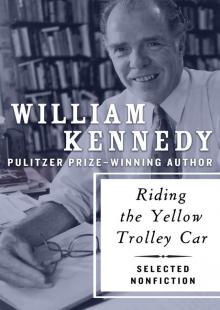 Riding the Yellow Trolley Car: Selected Nonfiction
Riding the Yellow Trolley Car: Selected Nonfiction Changó's Beads and Two-Tone Shoes
Changó's Beads and Two-Tone Shoes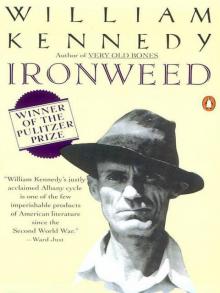 Ironweed
Ironweed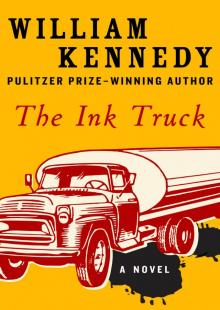 The Ink Truck
The Ink Truck Billy Phelan's Greatest Game
Billy Phelan's Greatest Game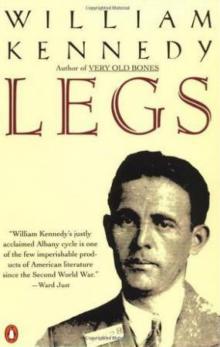 Legs
Legs Very Old Bones
Very Old Bones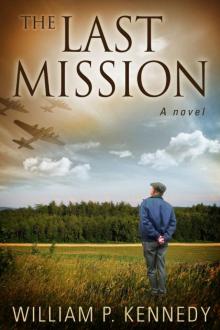 The Last Mission
The Last Mission The Flaming Corsage
The Flaming Corsage Roscoe
Roscoe Quinn's Book
Quinn's Book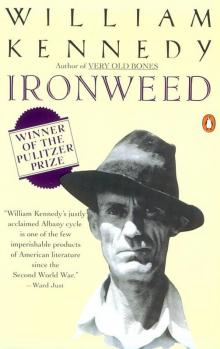 Ironweed (1984 Pulitzer Prize)
Ironweed (1984 Pulitzer Prize)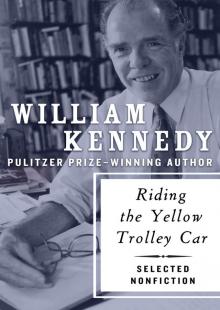 Riding the Yellow Trolley Car
Riding the Yellow Trolley Car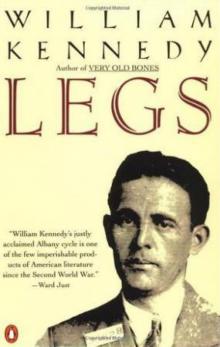 Legs - William Kennedy
Legs - William Kennedy